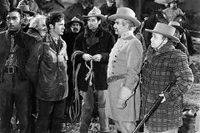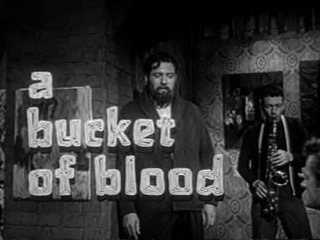Poetic Pictures: Movies as Poetic Art
Last night I attended a lecture at the library here in my town, where I also now happen to work. The lecturer was one of my former professors from BYU, Dean Duncan, who talked about 'Poetic Pictures', and how in this age where written and oral poetry isn't necessarily in vogue, people often forget that other art forms, such as cinema, can indeed be poetic.
 He briefly introduced the subject and outlined a few binary differences between prose and poetry such as, Statement/Suggestion, instruction/evocation, clarity/indirection, public/private, and the analogy that prose resembles the shortest distance between two points while poetry foregrounds the process or journey (he also noted that 'bad' poetry can pretty much have the same directness or effect as prose). Duncan then went on to discuss how not only the language in films takes on poetic elements, but the picture can show us images that are poetic in composition, allusion, suggestion, etc. This, he mentioned, was most certainly the case in the early days of cinema, where the lack of recorded dialog and sound effects rendered the films virtually silent. He pointed out that silent cinema was often rooted in narrative poetry - specifically some of the films of D.W. Griffith.
He briefly introduced the subject and outlined a few binary differences between prose and poetry such as, Statement/Suggestion, instruction/evocation, clarity/indirection, public/private, and the analogy that prose resembles the shortest distance between two points while poetry foregrounds the process or journey (he also noted that 'bad' poetry can pretty much have the same directness or effect as prose). Duncan then went on to discuss how not only the language in films takes on poetic elements, but the picture can show us images that are poetic in composition, allusion, suggestion, etc. This, he mentioned, was most certainly the case in the early days of cinema, where the lack of recorded dialog and sound effects rendered the films virtually silent. He pointed out that silent cinema was often rooted in narrative poetry - specifically some of the films of D.W. Griffith. He suggested that while films such as, So I married an Axe Murderer, often parodied the poetic form (in this case, beat poetry), other films such as Roger Corman's, A Bucket of Blood, managed to move from parody to celebration by actually being poetic in form/composition, and the spoken word. Leading from this example, Duncan also read a Scottish ballad to suggest that the familiarity by which many interpret generic works as common or silly (certainly not 'high' art) can also act as an access point into higher meanings or poetic suggestions. To illustrate his point, we viewed the final scene from William Wellman's, The Oxbow Incident, where Henry Fonda's face is obscured through shot composition as he reads the final letter. This has the effect of putting another, less familiar, actor's face in front of the well-liked/known Fonda in order to further implicate the viewer through the final moral message of the film. To create such a striking scene of poetic proportions in a Western invalidates the argument that genre films are crap because they just retread standard syntactic/semantic conventions in narrative and mise en scène.
He suggested that while films such as, So I married an Axe Murderer, often parodied the poetic form (in this case, beat poetry), other films such as Roger Corman's, A Bucket of Blood, managed to move from parody to celebration by actually being poetic in form/composition, and the spoken word. Leading from this example, Duncan also read a Scottish ballad to suggest that the familiarity by which many interpret generic works as common or silly (certainly not 'high' art) can also act as an access point into higher meanings or poetic suggestions. To illustrate his point, we viewed the final scene from William Wellman's, The Oxbow Incident, where Henry Fonda's face is obscured through shot composition as he reads the final letter. This has the effect of putting another, less familiar, actor's face in front of the well-liked/known Fonda in order to further implicate the viewer through the final moral message of the film. To create such a striking scene of poetic proportions in a Western invalidates the argument that genre films are crap because they just retread standard syntactic/semantic conventions in narrative and mise en scène.All in all, it was a brilliant way to spend a friday night, drawing connections between the various artistic traditions, while watching a few movie clips. There were even enough people there that the media auditorium in the basement of the library was standing-room only.
Now go read some poetry and watch a genre film.
Tagged under:
Film, Poetry, Art
Labels: News


0 Comments:
Post a Comment
<< Home